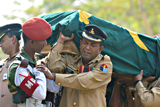Air force jets flew overhead in salute yesterday as Bangladesh held a mass state funeral for 49 army officers and one family member slain in a two-day mutiny by border guards that left as many as 148 people dead or missing.
Bangladeshi President Zillur Rahman and army chief General Moeen U. Ahmed led thousands of mourners at Muslim funeral prayers at a national parade ground in Dhaka, as the aircraft flew overhead.
Fifty flag-draped coffins, including two with remains of border guards chief Major-General Shakil Ahmed and his wife, Nazneen, were later carried away for burial at a graveyard near military headquarters.

PHOTO: AFP
Bangladeshi Prime Minister Sheikh Hasina’s government said it planned to form a tribunal to try those who organized the mutiny last Wednesday and Thursday, which she has called “a planned massacre” that may have received outside help.
Police have charged more than 1,000 border guards with murder, arson and hostage-taking during the mutiny, which ended through negotiations, promises of amnesty and threats of military force.
The government later withdrew its promise of amnesty for those directly responsible for the mutiny and massacre and sought to repair tense relations with the military.
Only 33 army officers are known to have survived the uprising that began on Wednesday at the Bangladesh Rifles border force headquarters, where as many as 181 officers were present for an annual meeting. Rescuers have recovered 77 bodies, while 71 officers were still unaccounted for.
The rebellion apparently erupted over the guards’ long-standing demands for parity in pay and other perks enjoyed by army officers, who lead the border forces.
Army troops, meanwhile, were deployed to help police search for border guards who failed to report back to bases following a government ultimatum ending on Sunday.
Hasina on Sunday met with military officials, who were furious that she had offered amnesty to the mutinous border guards to persuade them to surrender. The officers argued that lives could have been saved if Hasina had ordered an army assault on the guards’ compound.
The US Embassy said Washington has offered support, and Hasina told Parliament she has asked for help from the FBI to investigate the uprising.
“We’ll definitely unearth everything,” she said.
Teams searched for bodies buried in the compound or dumped in nearby sewers. Most of the missing were presumed dead, said Sheikh Mohammad Shajalal, a firefighter overseeing the search.
The insurrection has raised questions about the stability of Hasina’s two-month-old government in the impoverished South Asian country, which has seen nearly two dozen successful and failed military coups in its 38-year history.
The charges filed on Sunday named six border guards — including a deputy assistant director who led a team that negotiated the surrender with the government — and left more than 1,000 unnamed, police official Nobojyoti Khisa said. Thousands of border guards were at the headquarters when the mutiny began on Wednesday.
Some questioned whether the border guards acted on their own.
Ruling party spokesman Syed Ashraful Islam said initial evidence suggested the mutinous guards may have had outside assistance, but he did not elaborate.
Farukh Khan, a member of Hasina’s Cabinet and a former army officer, dismissed claims the mutiny was over low pay and told Parliament on Sunday that it was part of a “deep-rooted conspiracy” by people who wanted to destabilize the country.

IDENTITY: A sex extortion scandal involving Thai monks has deeply shaken public trust in the clergy, with 11 monks implicated in financial misconduct Reverence for the saffron-robed Buddhist monkhood is deeply woven into Thai society, but a sex extortion scandal has besmirched the clergy and left the devout questioning their faith. Thai police this week arrested a woman accused of bedding at least 11 monks in breach of their vows of celibacy, before blackmailing them with thousands of secretly taken photos of their trysts. The monks are said to have paid nearly US$12 million, funneled out of their monasteries, funded by donations from laypeople hoping to increase their merit and prospects for reincarnation. The scandal provoked outrage over hypocrisy in the monkhood, concern that their status

Trinidad and Tobago declared a new state of emergency on Friday after authorities accused a criminal network operating in prisons across the country of plotting to kill key government officials and attack public institutions. It is the second state of emergency to be declared in the twin-island republic in a matter of months. In December last year, authorities took similar action, citing concerns about gang violence. That state of emergency lasted until mid-April. Police said that smuggled cellphones enabled those involved in the plot to exchange encrypted messages. Months of intelligence gathering led investigators to believe the targets included senior police officers,

A disillusioned Japanese electorate feeling the economic pinch goes to the polls today, as a right-wing party promoting a “Japanese first” agenda gains popularity, with fears over foreigners becoming a major election issue. Birthed on YouTube during the COVID-19 pandemic, spreading conspiracy theories about vaccinations and a cabal of global elites, the Sanseito Party has widened its appeal ahead of today’s upper house vote — railing against immigration and dragging rhetoric that was once confined to Japan’s political fringes into the mainstream. Polls show the party might only secure 10 to 15 of the 125 seats up for grabs, but it is

Philippine President Ferdinand Marcos Jr is to meet US President Donald Trump this week, hoping Manila’s status as a key Asian ally would secure a more favorable trade deal before the deadline on Friday next week. Marcos would be the first Southeast Asian leader to meet Trump in his second term. Trump has already struck trade deals with two of Manila’s regional partners, Vietnam and Indonesia, driving tough bargains in trade talks even with close allies that Washington needs to keep onside in its strategic rivalry with China. “I expect our discussions to focus on security and defense, of course, but also